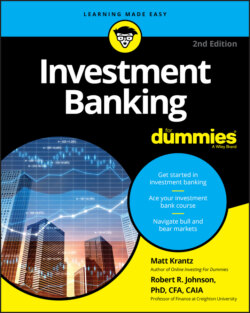Читать книгу Investment Banking For Dummies - Matthew Krantz - Страница 68
Getting Companies Ready for Sale on Public Markets
ОглавлениеThere comes a time in a company’s life when going public is often the best option. When a company gets big enough, and a broad enough audience of investors is lined up to buy a piece of a company, it’s time to strongly consider an IPO.
When a company goes public, it carves itself into pieces that investors in the general public can buy. Just about every stock you can invest in, at one point, first sold its stock in an IPO.
Companies often turn to IPOs when
Bank loans are too expensive. When a company gets bigger, borrowing from the bank becomes a relatively costly form of raising money.
Venture capitalists are too onerous. Venture-capital firms are great sources for young companies that don’t have many options. But these investors insist on big ownership stakes, stripping the entrepreneur’s ownership in the companies. Venture-capital funds are pools of money from private investors who are looking to hit it big.
Venture capitalists or other private investors want to cash out. Venture capitalists often buy companies with the idea that they’ll sell them once they get big enough to attract public investors. The IPO is a way for venture capitalists to cash in on their investment, so they can put that money into another small company. Private investors, such as private-equity firms, also urge companies to sell shares to the public so they can cash in.
Bonds are too expensive. Young companies can sell bonds to raise money. But bond investors are a nervous lot, and they tend to demand high rates of return on companies that don’t have a long-term, proven track record. Borrowing this way, especially for relatively unproven companies, can often be prohibitively expensive. Also, bonds must be repaid with interest. A young company may be reluctant to sign up for a deal that requires it to make routine interest payments when its cash flow may be uncertain.
After companies exhaust their normal avenues for raising money, that’s when IPOs come into play. IPOs are a way for companies to get investment capital from investors, who want to be owners. These owners are happy to get a piece of the company and don’t even require a routine payment of cash.
Don’t think that conducting an IPO is free. Those investment bankers need to eat, too, right? IPOs do have costs, which typically involves hiring a team of investment bankers to put together all the necessary documents to appease investors and put on meetings with investors, called roadshows. You can read about the importance of the roadshow, to whet investors’ appetites for the stock in Chapter 2. In this section, you find out about all the moving parts investment bankers may watch when selling a company’s stock to the public for the first time.
